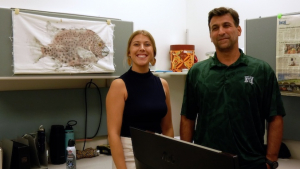
Spearfishing is more than a sport, it’s a way of living
—Rodrigo Barbano Weingrill
Spearfishing, a traditional practice deeply rooted in Hawaiian culture, does more than provide food, it plays an important role in supporting community health. A new study from the University of Hawaiʻi at Mānoa’s Thompson School of Social Work & Public Health highlights the physical and cultural benefits of this activity, offering valuable insight into the practice and how it can be used to promote well-being across the islands.
Published in PLOS One, the study was led by Lauryn Hansen, a 2023 Master of Public Health graduate and current Grau Fellow with Hawaiʻi Sea Grant, and Catherine Pirkle, professor in the Department of Public Health Sciences. The researchers explored how spearfishing supports physical activity, cultural identity, food security and a strong connection to both nature and community.
A cultural tradition in the Pacific

Spearfishing in the Pacific is more than a method of catching fish—it is a living tradition rooted in Indigenous knowledge and community values. Once commonly practiced during the Hawaiian Kingdom era, it continues today as a physically demanding and culturally significant activity that supports food security and strengthens social bonds. Passed down through generations, spearfishing remains a vital link between people, their heritage and the environment.
“Our findings highlight just how widely practiced spearfishing is among Indigenous and rural communities in Hawaiʻi,” said Hansen. “Recognizing and supporting activities that celebrate cultural identity allows for public health strategies that align with the values of our communities.”
Physical health benefits
While spearfishing offers numerous benefits, it remains largely excluded from formal health promotion efforts and public health data collection. The researchers hope to inspire more inclusive strategies that integrate traditional practices as effective tools for supporting health and wellness.

Using data from the 2019 and 2020 Hawaiʻi Behavioral Risk Factor Surveillance System survey, the team found that about 25% of adults in Hawaiʻi (1 in 4 residents) had engaged in spearfishing at some point in their lives. Participation was especially high among men (40% vs. 10% of women), Native Hawaiians (43%), other Pacific Islanders (36%), American Indian or Alaskan Native (32%), Japanese (26.2%), and rural residents of Molokaʻi (43%) and Lānaʻi (51%). All age groups reported similar lifetime engagement. Those who had spearfished were also more likely to meet physical activity guidelines compared to those who had not.
“Spearfishing is more than a sport, it’s a way of living,” said Rodrigo Barbano Weingrill, a researcher at the Yanagimachi Institute for Biogenesis Research and avid spearfisher. “Especially in Hawaiʻi, where the keiki learn pretty young in their lives, and they take it as more than a hobby, but a way to help their families to bring food home.”
Barbano Weingrill, who has been spearfishing for 25 years, added that the sport requires strength, endurance and a healthy lifestyle, all of which promote cardiovascular health.
Bridging tradition with modern public health
The study’s findings were presented at the International Society for Physical Activity and Health Congress in Paris. Related research from the same collaboration has also highlighted the health benefits of hula and outrigger canoe paddling. By bridging tradition and modern health strategies, the study offers a model for public health programs that are not only effective but also culturally meaningful to the communities they serve.
The project, in collaboration with the Hawaiʻi Department of Health and UH faculty members Tetine Sentell and Yan Yan Wu, supports the Public Health Resonance Project goal of promoting culturally relevant physical activities. It is also supported by the Chin Sik & Hyun Sook Chung Endowed Chair in Public Health Studies.


